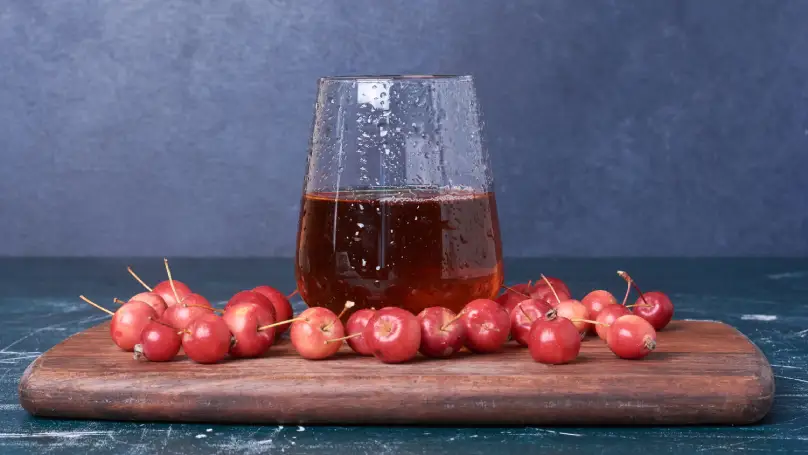Cherry juice concentrate delivers much more than just sweetness. In a compact serving—often one to two tablespoons—it provides a potent mix of calories, carbohydrates, sugar, electrolytes, and antioxidant compounds. This combination explains why top athletes—such as those in the Tour de France—favor tart cherry concentrate for post-race recovery and sleep support.
Researchers have found that cherry concentrate contains concentrated anthocyanins, melatonin, quercetin, and other phytochemicals that help reduce muscle inflammation, soreness, and oxidative stress after intense exercise. Its natural melatonin and tryptophan content may also promote better sleep quality and duration when consumed in the evening.
From a nutrition standpoint, a serving typically provides around 100–110 calories, 26 g of carbohydrates, 21 g natural sugar, about 1 g of protein, zero fat, and roughly 280 mg potassium plus minimal sodium and trace minerals—enough to support hydration and recovery without excess volume.
Nutrition Basics: Serving Size & Macronutrients
In cherry juice concentrate, serving size matters. A common serving is about 2.5 fl oz (roughly 74 ml). That small shot packs around 100 calories—surprisingly concentrated, right?focus on that scale helps set expectations. You’ll get almost no fiber and almost no fat—but significant sugar and carbs. It’s about efficiency: small dose, high intensity.
Calories, Carbs & Sugar
This section dives into the core nutrients in cherry juice concentrate—calories, total carbs, sugars, and how they compare across brands and serving sizes.
| Brand / Serving Size | Calories | Total Carbs | Sugars | Protein | Fat |
| Eden (1 tbsp) | 110 kcal | 26 g | 21 g | 1 g | 0 g │ |
| Lakewood Organic (4 tbsp) | 140 kcal | 33 g | 24 g | 2 g | 0 g │ |
| King Orchards (1 fl oz / 2 tbsp) | 110 kcal | 26 g | 21 g | 1 g | 0 g │ |
| Tart is Smart (2 tbsp / 1 oz) | 80 kcal | 19 g | 15 g | 1 g | 0 g │ |
Cherry juice concentrate gives you an efficient burst of energy and carbs, but that comes with a hefty dose of sugar. Always check labels, pay attention to serving sizes, and consider how you mix it.
Micronutrients: Vitamins & Minerals
Cherry juice concentrate delivers modest amounts of key micronutrients. A typical 2.5 fl oz serving (such as Cheribundi Pure Concentrate) contains roughly 0 mg calcium, 0 mg iron, and 320 mg potassium—about 7 % of your daily value. It offers no vitamin D or calcium, while protein and fat remain negligible.
Eden’s concentrate (serving ~1 Tbsp) similarly reports 20 mg calcium (2 % DV), no iron, and 280 mg potassium (6 % DV) . Looked at another way, a full 8 oz serving of tart cherry juice (not concentrate) typically offers about 33 g carbohydrates, 159 calories, 433 mg potassium (roughly 9 % DV), 35 mg calcium, and 1.13 mg iron.

Antioxidants & Phytochemicals
Cherry juice concentrate is more than just sweet—it’s loaded with powerful plant compounds called polyphenols that work behind the scenes to support your health. Especially rich in anthocyanins, tart cherry concentrate typically delivers around 216 mg per 30 ml serving, along with ~605 mg of total phenolic compounds. These include flavonoids like cyanidin‑3‑glucoside, quercetin, kaempferol, and proanthocyanidins, all of which act together to strengthen your body’s antioxidant defenses.
List of key compounds:
- Anthocyanins (e.g. cyanidin, peonidin): give the deep red color and support antioxidant enzyme activity
- Phenolic acids (e.g. chlorogenic acid): help neutralize free radicals and may lower inflammation
- Flavonols (e.g. quercetin, kaempferol): affect cellular pathways, potentially reducing inflammatory markers like COX‑1/2 and NF‑κB activity
These compounds don’t just soak up free radicals—they activate pathways like Nrf2 to boost your body’s own antioxidant enzymes, while dampening enzymes linked to inflammation. Cherry concentrate registers some of the highest ORAC antioxidant scores among fruits—12800 ORAC units per 100 g, well above frozen or dried cherries.
Concentrate vs Regular Juice: Which Is Better?
When comparing cherry juice concentrate with regular (not-from-concentrate) cherry juice, the key difference is simply water content. Concentrate removes water, packing nutrients—and sugars—into a smaller volume. When reconstituted, it becomes juice again. Whether you use concentrate or not from concentrate, which is better depends on your priorities.
According to multiple sources, nutritional value is nearly the same between the two—once diluted to the same final strength—and both deliver natural sugars, potassium, and phytonutrients like anthocyanins and flavonoids.
In summary, for the question concentrate or not from concentrate, which is better? the answer: nutritionally, they’re nearly equivalent per serving. Your choice comes down to convenience, taste preference, and how much processing you’re comfortable with.
Conclusion
Cherry juice concentrate offers a nutrient-rich, potent boost especially when you want a high dose of natural sugars, potassium, and antioxidant compounds in just a small serving. With concentrated anthocyanins, flavonoids, and melatonin-like compounds, it supports recovery, inflammation reduction, and better sleep. But it also delivers a heavy sugar load in limited volume, so treat it like a supplement rather than a beverage.
When sourcing high‑quality concentrate, choosing a reputable sour cherry juice concentrate supplier matters.





